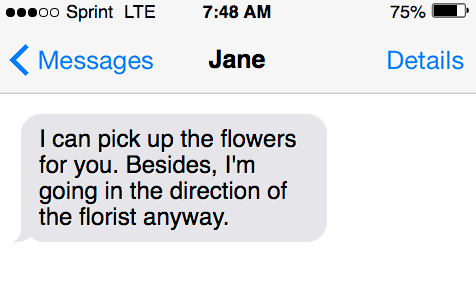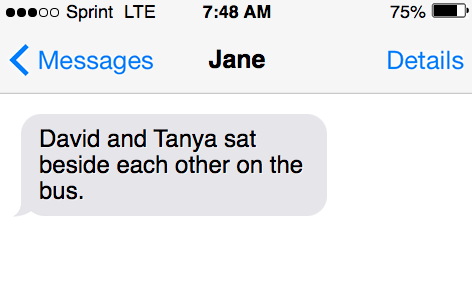The words “beside” and “besides” aren’t separated by much. One simple “s” letter can change their entire meaning. And relationship to other nouns (or objects). It can get confusing when we want to refer to a change of subject or a position of an object.
Learn the difference between “besides” and “beside” in this short guide…
What Does “Besides” Mean?
Several people face some perplexity while using the words beside vs. besides. The word besides (with the s) can be used as an adverb or a preposition, depending upon the context.
Besides, when used as a preposition means, *apart from* or *in addition to*.
However, when used in the context of an adverb, it means *furthermore*, *moreover*, *as well*, *another thing*.
For example:
- Besides Alice, has anyone else not submitted their assignment?
- Besides, there is more to it than what meets the eye.
- No one besides the CEO can call the shots on this issue.
- Besides, it is not the same color as I wanted.
| Word | Form/Variation |
| Besides | Apart from (preposition) |
| Besides | In addition to (preposition) |
What Does “Beside” Mean?
The word beside is a preposition. It indicates the location of a place (or something). In other words, beside means by the side, next to, or near something.
Beside, the preposition, is used to place two nouns physically next to each other.
It’s mostly used in a formal context (business emails, proposals, and presentations).
For example:
- Your trousers are hanging beside your shirt in the closet.
- May I sit beside you during the show?
- I live right beside your house.
Differences Between “Beside” vs. “Besides”
The two words are quite different from each other. Beside as a word that puts two nouns next to each other in a sentence. For example, “I always keep my sugar candy beside me.”
Whereas, besides, can get used as an adverb or preposition in a sentence. For example, “I do not like fishing, besides I do not own a fishing boat.”
The reason some people often get confused when talking about beside vs besides is because they have similar spelling with the exception of the “s” at the end. The “s” changes the meaning of the word entirely.

When to Use “Beside”
The word beside is a preposition that means *by the side* or *next to.* It essentially indicates the place or location of a thing.
You should use beside when you want to put two nouns next to each other.
Sentence Examples
- David and Tanya sat beside each other on the bus.
- I keep a glass of water beside my bed each night.
- I wish to sit beside you at the lunch table.
- The newspaper is kept beside you on the chair.
Beside is mainly used in formal communication. The above example sentences are grammatically correct. And are consistent in their meaning if “beside” was replaced by “next to” or “by the side.”
When to Use “Besides”
Use besides as a preposition or an adverb in a sentence.
It can be used as a preposition when you want to convey the meaning *, in addition,* or as an adverb when you want to convey the meaning *moreover.* Besides is less formal in tone.

For example:
- I do not like late-night parties. Besides, I have an early morning flight to catch.
When replaced with the synonym moreover, the writing will sound more formal.
For example:
- I do not like late-night parties, moreover, I have an early morning flight to catch.
The same goes for using *in addition* when replacing the word besides.
Sentence Examples
- I can pick up the flowers for you. Besides, I’m going in the direction of the florist anyway.
- Besides the fact that I am too tired after the flight, I wouldn’t like to mingle with those people.
- No one else besides the school principal can permit you to attend the play during school hours.
- Besides being an expert at the game, he has years of experience in coaching.
“Besides” and “beside” synonyms
Knowing a words synonyms can give us a better grasp of the meanings. And their overall use in the English language.
Here are the synonyms for each of the words:
- Synonyms for beside – near, close to, next to, a step away from, alongside, at the edge of, abreast of, adjacent to, abreast of, at your elbow, by, neighboring, etc.
- Synonyms for besides (adverb) – in addition, also, on top of that, to boot, moreover, furthermore, in any case.
When used as a preposition – in addition to, over, and above, as well as, not including, barring, except, etc.
When used as an adverb – again, additionally, yet, also, likewise, further, moreover, furthermore, etc.
Is it “besides the point” or “beside the point”
A commonly used phrase with both of the words occurs in English. It is the phrase “besides the point.” We can get confused with the differences between “beside the point” or “besides the point.”
The correct term and appropriate spelling are “beside the point” (and not “besides the point”). This is an idiom that translates to “unimportant.”
Inside this article
Fact checked:
Content is rigorously reviewed by a team of qualified and experienced fact checkers. Fact checkers review articles for factual accuracy, relevance, and timeliness. Learn more.
Core lessons
Glossary
- Abstract Noun
- Accusative Case
- Anecdote
- Antonym
- Active Sentence
- Adverb
- Adjective
- Allegory
- Alliteration
- Adjective Clause
- Adjective Phrase
- Ampersand
- Anastrophe
- Adverbial Clause
- Appositive Phrase
- Clause
- Compound Adjective
- Complex Sentence
- Compound Words
- Compound Predicate
- Common Noun
- Comparative Adjective
- Comparative and Superlative
- Compound Noun
- Compound Subject
- Compound Sentence
- Copular Verb
- Collective Noun
- Colloquialism
- Conciseness
- Consonance
- Conditional
- Concrete Noun
- Conjunction
- Conjugation
- Conditional Sentence
- Comma Splice
- Correlative Conjunction
- Coordinating Conjunction
- Coordinate Adjective
- Cumulative Adjective
- Dative Case
- Determiner
- Declarative Sentence
- Declarative Statement
- Direct Object Pronoun
- Direct Object
- Diction
- Diphthong
- Dangling Modifier
- Demonstrative Pronoun
- Demonstrative Adjective
- Direct Characterization
- Definite Article
- Doublespeak
- False Dilemma Fallacy
- Future Perfect Progressive
- Future Simple
- Future Perfect Continuous
- Future Perfect
- First Conditional
- Irregular Adjective
- Irregular Verb
- Imperative Sentence
- Indefinite Article
- Intransitive Verb
- Introductory Phrase
- Indefinite Pronoun
- Indirect Characterization
- Interrogative Sentence
- Intensive Pronoun
- Inanimate Object
- Indefinite Tense
- Infinitive Phrase
- Interjection
- Intensifier
- Infinitive
- Indicative Mood
- Participle
- Parallelism
- Prepositional Phrase
- Past Simple Tense
- Past Continuous Tense
- Past Perfect Tense
- Past Progressive Tense
- Present Simple Tense
- Present Perfect Tense
- Personal Pronoun
- Personification
- Persuasive Writing
- Parallel Structure
- Phrasal Verb
- Predicate Adjective
- Predicate Nominative
- Phonetic Language
- Plural Noun
- Punctuation
- Punctuation Marks
- Preposition
- Preposition of Place
- Parts of Speech
- Possessive Adjective
- Possessive Determiner
- Possessive Case
- Possessive Noun
- Proper Adjective
- Proper Noun
- Present Participle
- Prefix
- Predicate



